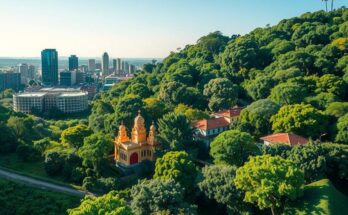President Recep Tayyip Erdogan appears to be gaining favorable momentum due to recent geopolitical developments, particularly concerning Syria, the Kurdish conflict, and Turkey’s economic outlook. However, significant uncertainties and challenges loom, casting doubt on whether these opportunities will truly strengthen Turkey in the long run.
In the current geopolitical climate, Turkish President Recep Tayyip Erdogan finds himself potentially positioned for beneficial outcomes. Having held power for over two decades, he aims to extend his tenure beyond the 2028 term limit, with a series of favorable developments occurring concurrently, as noted by Emre Peker from Eurasia Group.
Erdogan has seen progress with the Assad regime’s fall in Syria, which he has long sought. This upheaval promises to enable the return of Syrian refugees to Turkey, with over 80,000 already returning. Additionally, Turkey has established a military partnership with the new Syrian government led by Ahmad al-Sharaa, signaling increased economic and strategic influence in Syria.
Moreover, the Kurdish conflict, which has persisted for four decades, may find resolution as the PKK, the primary Kurdish militant group, expresses willingness to cease hostilities. This development could end a protracted struggle that has claimed many lives, representing a potential turning point for the nation.
In Ukraine, a ceasefire would work in Turkey’s favor, particularly for its construction firms eager for reconstruction opportunities. Erdogan’s approach places Turkey as a possible mediator, maintaining connections with both Russia and Ukraine, thus enhancing its influential role in the region. Additionally, should the United States reduce its defense commitments in Europe, Turkey could emerge as a critical supplier of arms and a vital intermediary with Russia, though this scenario raises concerns among NATO allies.
On the economic front, while inflation remains high at 39%, it represents a significant decrease, marking the lowest levels in nearly two years. The Central Bank is cautiously lowering rates, and Turkey’s GDP experienced a growth of 3.2% last year, surpassing expectations.
Despite these favorable signs, significant challenges loom. The Syrian government, led by al-Sharaa, has yet to establish stability, and any resurgence of violence could upend Erdogan’s economic plans linked to Syria. The Kurdish issue necessitates a delicate compromise; Erdogan must balance granting autonomy to the Kurds without alienating nationalist allies, integral to his current political support.
Additionally, Turkey’s potential benefits from European defense spending are uncertain, as the EU may prioritize domestic job creation over collaborating with Ankara. The deterioration of U.S. security assurance could also pose severe risks for Turkey, especially concerning the critical Incirlik Airbase, which hosts American nuclear weapons and troops.
In summation, while Erdogan currently experiences a range of positive developments, the situation remains complex and uncertain. The outcomes are not guaranteed to result in a strengthened Turkey, as various intertwined issues could impact the future trajectory of his governance significantly.
In conclusion, President Recep Tayyip Erdogan is navigating a landscape filled with opportunities and significant challenges. Although favorable developments regarding Syria, the Kurdish conflict, and potential economic growth present advantages, underlying uncertainties and geopolitical instabilities could impede progress. Consequently, Erdogan’s aspirations for a stronger Turkey are far from assured, highlighting the intricate dynamics at play.
Original Source: www.gzeromedia.com




